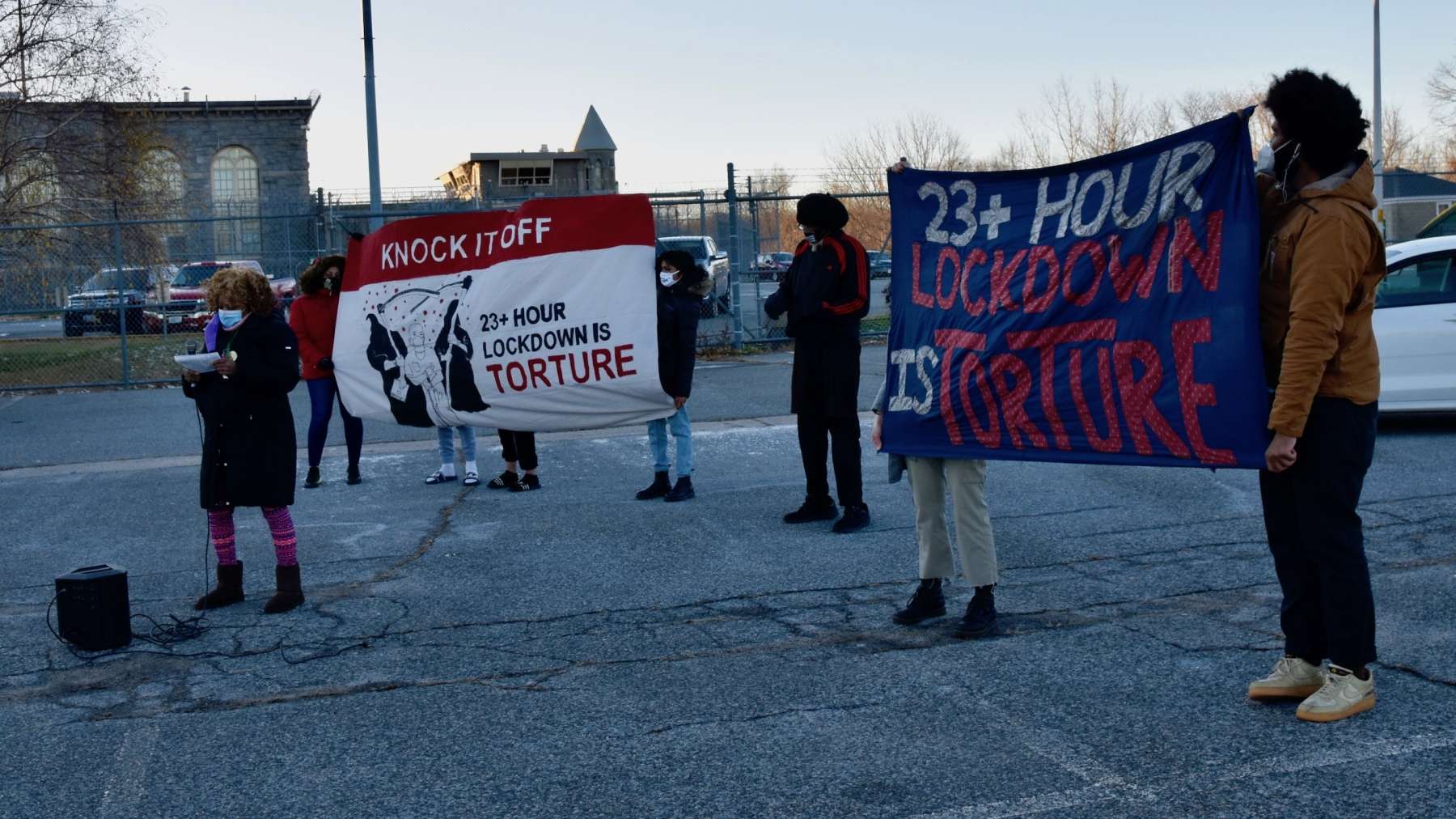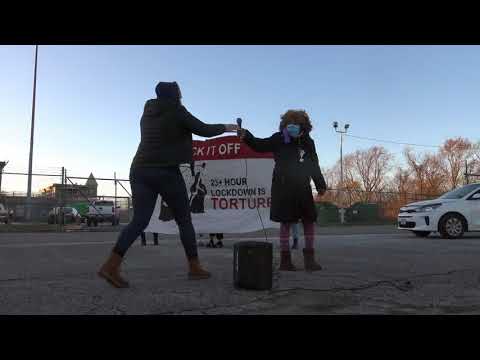As the pandemic rages inside, advocates, families and allies rally at the ACI
Presently, the number of cases among incarcerated individuals at the ACI, is surging past 570 with nearly 100% of those incarcerated in the Maximum Security building in particular, now COVID-19 positive…
Rhode Islanders concerned for the well being of those incarcerated in the state’s carceral facilities took to the streets of Cranston and circled the premises of the Adult Correctional Institutions (ACI) in a car rally on Sunday. Drivers taped posters to their windows and circled the roads of the ACI in protest of the Rhode Island Department of Corrections’ (RIDOC) and Governor Gina Raimondo’s mishandling of the COVID-19 pandemic within the ACI. Honking and waving at incarcerated people in the facilities, they stopped outside Maximum facility to deliver demands and chant. Formerly incarcerated people with loved ones inside spoke on the inhumane conditions and described the neglect of the incarcerated population during a pandemic as “genocide.” Their presence and messaging pointed out means of reducing and protecting the current population and reminded Rhode Island leadership that a prison sentence should not equate to a death-by-COVID-19 sentence.


For nine months, a group of formerly incarcerated Rhode Islanders, loved ones of those currently incarcerated, and community allies have been mobilizing to prevent the spread of COVID-19 in the ACI. Those efforts have been met with silence and inaction by Governor Raimondo and RIDOC. Incarcerated Rhode Islanders and their loved ones have consistently made reports of insufficient medical care, limited access to Personal Protective Equipment (PPE) and cleaning supplies, prison staff shirking Center for Disease Control (CDC) guidelines, haphazard quarantine policies, and inhumane restrictions. Raimondo has remained steadfast in her apathy towards those behind bars, passing the buck to a Department of Corrections whose long standing Medical Director recently resigned after nearly 450 of approximately 2100 incarcerated Rhode Islanders contracted coronavirus in November alone.
Presently, the number of cases among incarcerated individuals at the ACI, is surging past 570 with nearly 100% of those incarcerated in the Maximum Security building in particular, now COVID-19 positive. Leonard Jefferson, an organizer with DARE’s Behind the Walls Committee, who maintains that he spent seventeen years wrongly imprisoned at the ACI in Maximum Security states, “In 1977, United States District Court Judge Raymond Pettine ruled that Maximum Security could not meet public health and safety standards in the case of Palmigiano v Gaharry. The lack of proper ventilation makes it the perfect place for COVID-19 to spread and the presence of mold in the building has long made it unfit for human habitation according to state law. Maximum Security was a public health hazard before the pandemic, remains so during the pandemic, and will continue to be so after the pandemic.”
Medium Security has the next highest number of cases, followed by the Intake Service Center where the number of people detained pre-trial has climbed by 20% between April and October of this year. Presently, approximately 800 Rhode Islanders who have not been convicted, or who are merely being held on probation or parole violations, remain indefinitely trapped in a building with rapidly spreading COVID -19 cases as courts delay hearings and trials.
Throughout their socially distant rally, the organizers and protestors demanded that in order to address this crisis, RIDOC, Governor Raimondo, Attorney General Peter Nehrona, and Rhode Island’s courts increase transparency, heighten safety regulations, and do all they can to release as many people as possible. Their demands include:
- Halt arrests and grant personal recognizance so that our loved ones are not being held indefinitely at Intake waiting for court hearings and trials.
- Reduce the prison population to control the spread of disease. Restore lost good time. Expedite parole hearings and release all eligible individuals. Utilize medical parole for all terminally ill, elderly, and immunocompromised individuals. Release all other eligible individuals into community confinement.
- Recognize the ACI as a priority community for the COVID-19 vaccination, with an informed consent or opt-out process for the population.
- Provide our loved ones with adequate Personal Protective Equipment (masks, soap, hand sanitizer) as recommended by the CDC.
- Regularly administer universal testing across the population, including asymptomatic people.
- Provide transparency and accountability to incarcerated people’s families. Publicly release a quarantine plan for staff and incarcerated people who test positive, as well as a formal process for family members to report noncompliance. Report daily COVID-19 numbers on the RIDOC website and social media.
Sunday’s event stressed that while the issue of COVID-19 in the ACI is one of public health, it is also deeply related to race and socioeconomic status. Racial and class-based disparities have characterized the pandemic in our state, where almost 40% of those who have contracted COVID-19 are Latinx, despite representing just 16% of the general population, and our poorest cities have been devastated by the virus. As Jefferson notes, if a more robust pandemic response is not swiftly carried out, the outcomes in the ACI are certain to mirror those on the outside, to even greater extremes, “The virus is affecting communities of color more so than communities not comprised of people of color, with African Americans and Latinx Americans dying at much higher rates than white people. I imagine the same will be true at the ACI and that the death toll may turn out to be higher than that of the outside world since minorities are so overrepresented and because of the fact that the medical care for those with pre-existing conditions is inadequate with or without COVID-19.”
With the support of various grassroots organizations, and many incoming legislative representatives, Sunday’s car rally told our leaders that we need them to act with urgency and not take lightly the seriousness of what is unfolding. In times of crisis, the success of our leaders and institutions should be measured by the care provided to and the health outcomes of those most vulnerable – the incarcerated.
Direct Action for Rights and Equality (DARE), the Formerly Incarcerated Union of RI (FIURI), Black and Pink Providence, and Never Again Action Rhode Island were among the organizers of this event.


















